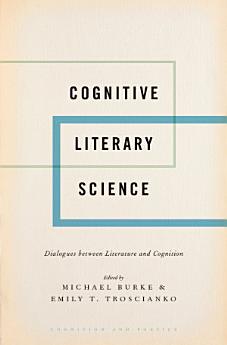Cognitive Literary Science: Dialogues between Literature and Cognition
Michael Burke · Emily T. Troscianko
ធ្នូ 2016 · Oxford University Press
សៀវភៅអេឡិចត្រូនិច
304
ទំព័រ
family_home
មានសិទ្ធិ
info
reportការវាយតម្លៃ និងមតិវាយតម្លៃមិនត្រូវបានផ្ទៀងផ្ទាត់ទេ ស្វែងយល់បន្ថែម
អំពីសៀវភៅអេឡិចត្រូនិកនេះ
This book brings together researchers with cognitive-scientific and literary backgrounds to present innovative research in all three variations on the possible interactions between literary studies and cognitive science. The tripartite structure of the volume reflects a more ambitious conception of what cognitive approaches to literature are and could be than is usually encountered, and thus aims both to map out and to advance the field. The first section corresponds to what most people think of as "cognitive poetics" or "cognitive literary studies": the study of literature by literary scholars drawing on cognitive-scientific methods, findings, and/or debates to yield insights into literature. The second section demonstrates that literary scholars needn't only make use of cognitive science to study literature, but can also, in a reciprocally interdisciplinary manner, use a cognitively informed perspective on literature to offer benefits back to the cognitive sciences. Finally, the third section, "literature in cognitive science", showcases some of the ways in which literature can be a stimulating object of study and a fertile testing ground for theories and models, not only to literary scholars but also to cognitive scientists, who here engage with some key questions in cognitive literary studies with the benefit of their in-depth scientific knowledge and training.
អំពីអ្នកនិពន្ធ
Michael Burke is Professor of Rhetoric at University College Roosevelt (Utrecht University). He is the author of Literary Reading Cognition and Emotion: An Exploration of the Oceanic Mind (2011). He has published numerous chapters and articles on the topic of cognitive literary science. His areas of interest also include classical rhetoric, stylistics, and pragmatics. Emily T. Troscianko is a Research Associate in the Faculty of Medieval and Modern Languages at the University of Oxford, and in 2014-15 was a Knowledge Exchange Fellow at the Oxford Research Centre in the Humanities, collaborating with Beat, the leading UK eating disorders charity. The book from her doctoral thesis, Kafka's cognitive realism, came out with Routledge in 2014, and she is now working at the intersection of the cognitive and medical humanities, while co-authoring, with Susan Blackmore, the third edition of the psychology textbook Consciousness: An Introduction.
វាយតម្លៃសៀវភៅអេឡិចត្រូនិកនេះ
ប្រាប់យើងអំពីការយល់ឃើញរបស់អ្នក។
អានព័ត៌មាន
ទូរសព្ទឆ្លាតវៃ និងថេប្លេត
ដំឡើងកម្មវិធី Google Play Books សម្រាប់ Android និង iPad/iPhone ។ វាធ្វើសមកាលកម្មដោយស្វ័យប្រវត្តិជាមួយគណនីរបស់អ្នក និងអនុញ្ញាតឱ្យអ្នកអានពេលមានអ៊ីនធឺណិត ឬគ្មានអ៊ីនធឺណិតនៅគ្រប់ទីកន្លែង។
កុំព្យូទ័រយួរដៃ និងកុំព្យូទ័រ
អ្នកអាចស្ដាប់សៀវភៅជាសំឡេងដែលបានទិញនៅក្នុង Google Play ដោយប្រើកម្មវិធីរុករកតាមអ៊ីនធឺណិតក្នុងកុំព្យូទ័ររបស់អ្នក។
eReaders និងឧបករណ៍ផ្សេងទៀត
ដើម្បីអាននៅលើឧបករណ៍ e-ink ដូចជាឧបករណ៍អានសៀវភៅអេឡិចត្រូនិក Kobo អ្នកនឹងត្រូវទាញយកឯកសារ ហើយផ្ទេរវាទៅឧបករណ៍របស់អ្នក។ សូមអនុវត្តតាមការណែនាំលម្អិតរបស់មជ្ឈមណ្ឌលជំនួយ ដើម្បីផ្ទេរឯកសារទៅឧបករណ៍អានសៀវភៅអេឡិចត្រូនិកដែលស្គាល់។





